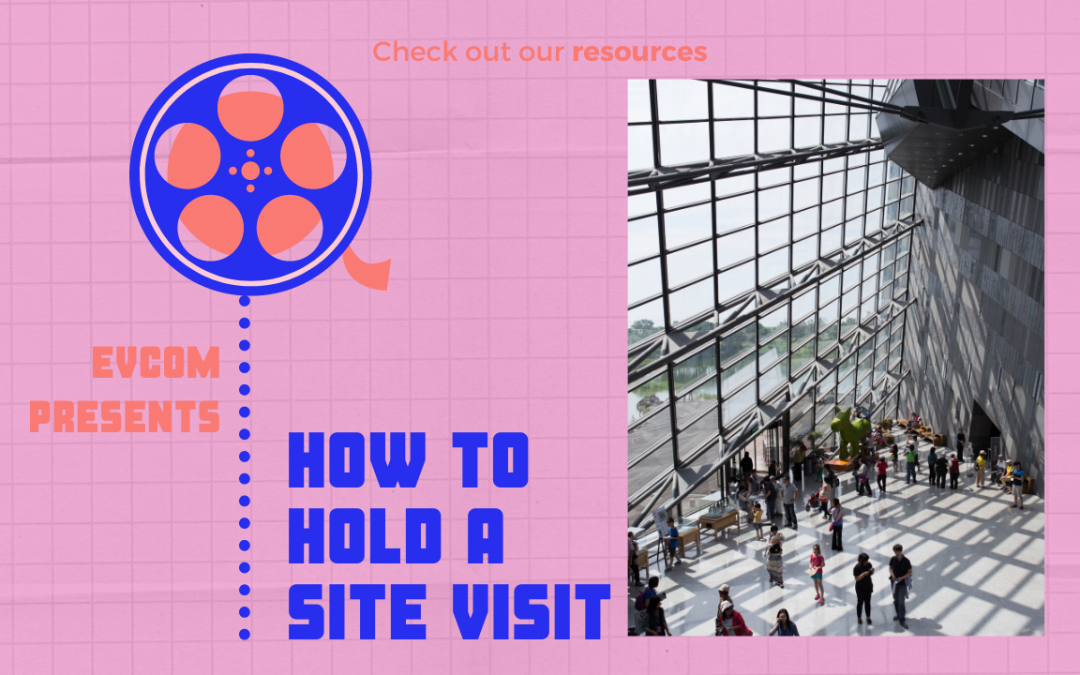One of the big decisions when you’re putting on an event is which venue to use. You might be choosing from a few different ones, or have been given one to work with. Either way you’ll want to go and visit it, and this is called a site visit.
Site visits are your opportunity to ask questions of someone who works at the venue, and to see it all for yourself. Maybe you are still in the process of deciding which venue you are going to use, or maybe you are figuring out how to make the venue you’ve got work for you. Either way, it’s great to go in with a list of questions you want to ask, to make sure you don’t get forget anything. So what should you be asking?
- What’s included? Sometimes venues can tell you a price that sounds reasonable but before you know it they are charging you extra for every chair and table cloth and wifi password! Others have all or some of the things you’ll need included. At your site visit speak to your venue contact about what they have included and ask them to send this list over to you on email as well. For anything that is not included, find out how much they charge for it so you can compare prices with other suppliers. The venue might not include table decorations in their price, but their table decorations might end up being cheaper than ones other companies could supply, for example.
- Let’s get technical. You will probably be using tech in your event, whether that’s a sound system to play music through, lighting, or a more complicated set up with microphones and live music. Ask the venue what tech they can provide, and whether it comes at any extra cost. If you are using more complicated tech, you might want a technician to operate it. Does the venue have a technician that you can/have to use?
- Sustainability is something all event organisers need to think about. Ask the venue about their sustainability and recycling policies and think about how you can use the space to be as sustainable as possible. For example, if the venue have some TV screens on stands available, you could use these as digital signage rather than printing off lots of signage that you’ll then throw away at the end of the event.
- Bring your suppliers with you. Sometimes venues want you to work with certain ‘preferred’ suppliers who know their venue well. Sometimes venues are happy for you to use suppliers of your choice. If you are working with lots of external suppliers, they will probably want to go on a site visit as well. There’s no need to bring them along if you are still in the process of deciding which venue you are going to go for, but once you’ve decided, it’s worth asking your suppliers whether they’d like to join you on your site visit so they can see the space for themselves. If your suppliers don’t come with you, then it’s worth asking some questions on their behalf about how early they can get in and whether they can park to load/unload.
- Accessible and inclusive. Find out how accessible your venue is, and whether the venue need advanced notice of people’s access needs. Is there a lift? Are the bathrooms only accessible by stairs? Is there any disabled parking nearby? It’s also worth thinking about inclusivity in your venue. Is there a gender neutral bathroom, and if not, could you create one? Find this all out and then make sure you display this information on your website. If your venue isn’t fully accessible, put details about it on the event page instead e.g. there are three steps up to the venue.
- Are there any limitations? Find out what you can’t do. Older buildings might not be keen on you bluetacking signs to their walls. Building in residential areas might not let you play music after 11pm. Make sure you know what isn’t possible, so that you don’t arrive on the day to be told ‘no’ by the venue!
Don’t forget to take pictures and videos of the space. Try and get as much of the venue in as possible, and take pictures of everything from the space where you might have your registration table to the space where the event itself will take place. All of these spaces are part of your event attendee’s journey and experience, so you’ll want to think about all of them as you plan your event. And if you’re seeing lots of venues, it’s easy to get them mixed up. Pictures and videos will be a useful resource to refer back to throughout your event planning process.
Once you’ve decided on your venue, they’ll send you over a contract. It’s essential that you take the time to read this, especially cancellation and payment dates, and that you make sure it tracks with everything you discussed in person.
Good luck!



